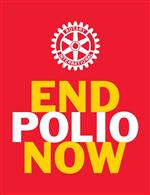How polio affected their lives
By Antoinette Tuscano
Rotary International News -- 23 October 2009
Historically, polio has been one of the greatest causes of disability.
Polio survivors and their families know all too well how the disease attacks the motor neurons of the brainstem, causing breathing difficulty and sometimes death. Some know what it's like to spend years, and maybe a lifetime, recovering from the disease.
For as little as US$0.60 worth of vaccine, a child can be protected against polio for life. Total eradication is vital. If polio isn't eradicated, the world will continue to live under the threat of the disease, with more than 10 million children at risk of becoming paralyzed over the next 40 years.
As World Polio Day, 24 October, approaches, we asked polio survivors to share their personal reasons for ending polio now. Read what they had to say below.

Ann Lee Hussey
Ann Lee Hussey is governor-elect of District 7780 (parts of Maine, Massachusetts, and New Hampshire, USA) and a member of the Rotary Club of Casco Bay-Sunrise (Portland Area), Maine. Hussey, chair of the Rotarian Action Group for Polio Survivors and Associates, contracted the disease when she was 17 months old, in July 1955. Her brother and uncle also had polio. Hussey says the disease temporarily paralyzed her from the waist down.
"My earliest recollections are my surgeries; constant physical therapy; Easter egg hunts from a wheelchair in the hospital; hot, heavy, and itchy plaster of Paris casts; heavy metal braces with leather straps; Buster Brown shoes with soles to accommodate my braces; a special janitor, Mr. Clark, who carried me up the stairs at school; continuing stares as I walked down the street; the inability to walk barefoot or to run; and the struggle of buying shoes.
"No child should have to suffer from the crippling effects of polio when it is totally preventable. If we stop, polio will return with a vengeance to places where today's children do not even know what polio is. Rotary made a promise, and we keep our promises."

Urs Herzog
Urs Herzog, past governor of District 1980 and a member of the Rotary Club of Allschwil, Switzerland, contracted polio in 1956, when he was eight years old. Because of the disease's impact on his body, he was unable to participate in sports. But with medical intervention, he has been able to live a more or less normal life.
"When I learned about the polio initiative when I became a Rotarian, I knew that this will be a chance to share my experience as a polio victim and to do all my best to support this worldwide [effort]."
As district governor, Herzog and some Rotarian friends created the Swiss/Liechtenstein polio day on 13 September 2008 and raised more than 1 million Swiss francs (US$994,000). Read more

Zaheer "Zak" Ahmed
In 2007, as a 22-year-old student from Pakistan studying in Australia, Zaheer Ahmed began to experience a high fever and a pain in his lower back and legs. His symptoms were at first attributed to fever, but as the pain continued and he developed a limp, he visited a clinic, which referred him to Melbourne's Box Hill Hospital, where a doctor diagnosed him with polio, the first case diagnosed in Australia in 21 years. He was isolated at the hospital until he tested negative for the poliovirus.
"I think during my isolation, it was not just polio I was fighting with. I was caught with so many thoughts and scared feelings -- and especially loneliness. Allah blessed me with Rotary International. They helped me to overcome my stress and pain I felt during isolation and, most important, they made me feel that I'm not alone -- that there are still those who want to help me and want to be friends with me.
"It's a very important cause for which you all are working. I love Rotary. It was very hard to cope with this disease, but with the help of Allah and the Rotarians' care, I made it." Read more

Adrian Cornelius
Adrian Cornelius, past governor of District 1150 and a member of the Rotary Club of Caerphilly, Mid Glamorgan, Wales, was two years old when he contracted polio during World War II. Though he has little memory of that time, he heard from his parents how he was shuffled around from hospital to hospital for two years as different cities in South Wales were bombed.
"I remember well the aftermath of the disease from the age of five and into my early teens, when I was weak down my left side for many years. During that period, I was encouraged to partake in many physical activities, especially sporting ones." Cornelius said his legs didn't grow properly, stunting his growth by as much as 2 inches.
"It's so important that people realize what a terrible disease polio is and how it impacts the young. I was very, very lucky. It is so important that we finish the job."
Learn more about Rotary's effort to eradicate polio:
- Read about polio and what you can do to help
- Watch a video about what it takes to eradicate polio
- Help End Polio Now by buying tickets to the 2 December benefit concert with Itzhak Perlman
- See a list of famous people who have had polio
Download the website sponsorship guide









